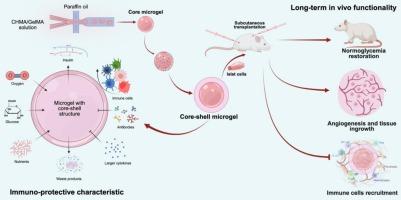一种用于糖尿病强化胰岛移植的持久免疫保护核-壳微凝胶
IF 13.2
1区 工程技术
Q1 ENGINEERING, CHEMICAL
引用次数: 0
摘要
1型糖尿病(T1DM)仍然是一个重大的治疗挑战,由于自身免疫破坏胰岛素生成β-细胞。胰岛移植带来了希望,但也面临着免疫排斥和细胞存活率差等障碍。在这里,我们设计了一种创新的核-壳微凝胶系统,用于持久的免疫保护胰岛细胞包封。以甲基丙烯酸明胶(GelMA)和甲基丙烯酸壳聚糖(CHMA)为核心,聚乙二醇二丙烯酸酯(PEGDA)和海藻酸盐(Alg)为外壳材料,在自制的微流控装置上制备微凝胶,形成核-壳结构。这种设计表现出优异的免疫隔离特性,允许营养物质交换,但阻断免疫成分。体外评估显示持续的细胞活力和葡萄糖反应性胰岛素分泌。将这些微凝胶移植到糖尿病大鼠模型中60 天后血糖水平恢复正常。值得注意的是,微凝胶促进了宿主组织的整合和血管生成。这些动物的体重恢复了,但纤维化包被很小。这些发现使我们的核壳微凝胶成为基于细胞的糖尿病治疗的变革性平台,有可能消除对慢性免疫抑制的需求。本文章由计算机程序翻译,如有差异,请以英文原文为准。

A durable immuno-protective core-shell microgel for the enhanced pancreatic islet transplantation in diabetes therapy
Type 1 diabetes mellitus (T1DM) remains a significant therapeutic challenge due to the autoimmune destruction of insulin-producing β-cells. Islet transplantation offers promise but faces hurdles like immune rejection and poor cell survival. Here, we engineered an innovative core-shell microgel system for durable immune-protective islet cell encapsulation. The microgels were fabricated in our home-made droplet-based microfluidic device, with gelatin methacrylate (GelMA) and chitosan methacrylate (CHMA) as the core, and polyethylene glycol diacrylate (PEGDA) and alginate (Alg) as the shell materials to make core-shell structure. This design demonstrated excellent immuno-isolation properties, permitting nutrient exchange but blocking immune components. In vitro assessments revealed the sustained cell viability and glucose-responsive insulin secretion. The transplantation of these microgels into diabetic rat models exhibited the normalized blood glucose levels for 60 days. Notably, the microgels facilitated host tissue integration and angiogenesis. The animals achieved weight recovery but minimal fibrotic encapsulation. These findings position our core-shell microgels as a transformative platform for cell-based diabetes therapy, potentially eliminating the need for chronic immunosuppression.
求助全文
通过发布文献求助,成功后即可免费获取论文全文。
去求助
来源期刊

Chemical Engineering Journal
工程技术-工程:化工
CiteScore
21.70
自引率
9.30%
发文量
6781
审稿时长
2.4 months
期刊介绍:
The Chemical Engineering Journal is an international research journal that invites contributions of original and novel fundamental research. It aims to provide an international platform for presenting original fundamental research, interpretative reviews, and discussions on new developments in chemical engineering. The journal welcomes papers that describe novel theory and its practical application, as well as those that demonstrate the transfer of techniques from other disciplines. It also welcomes reports on carefully conducted experimental work that is soundly interpreted. The main focus of the journal is on original and rigorous research results that have broad significance. The Catalysis section within the Chemical Engineering Journal focuses specifically on Experimental and Theoretical studies in the fields of heterogeneous catalysis, molecular catalysis, and biocatalysis. These studies have industrial impact on various sectors such as chemicals, energy, materials, foods, healthcare, and environmental protection.
 求助内容:
求助内容: 应助结果提醒方式:
应助结果提醒方式:


